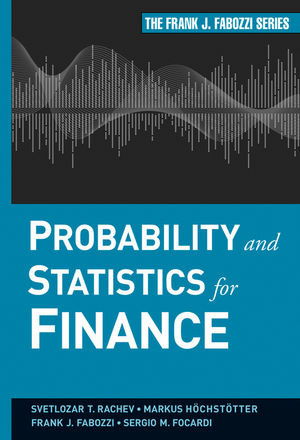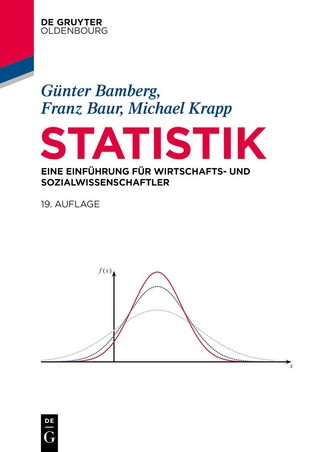
Probability and Statistics for Finance
John Wiley & Sons Inc (Verlag)
978-0-470-40093-7 (ISBN)
A comprehensive look at how probability and statistics is applied to the investment process
Finance has become increasingly more quantitative, drawing on techniques in probability and statistics that many finance practitioners have not had exposure to before. In order to keep up, you need a firm understanding of this discipline.
Probability and Statistics for Finance addresses this issue by showing you how to apply quantitative methods to portfolios, and in all matter of your practices, in a clear, concise manner. Informative and accessible, this guide starts off with the basics and builds to an intermediate level of mastery.
• Outlines an array of topics in probability and statistics and how to apply them in the world of finance
• Includes detailed discussions of descriptive statistics, basic probability theory, inductive statistics, and multivariate analysis
• Offers real-world illustrations of the issues addressed throughout the text
The authors cover a wide range of topics in this book, which can be used by all finance professionals as well as students aspiring to enter the field of finance.
SVETLOZAR T. RACHEV, PhD, DSC, is Chair Professor at the University of Karlsruhe in the School of Economics and Business Engineering, and Professor Emeritus at the University of California, Santa Barbara, in the Department of Statistics and Applied Probability. He was cofounder of Bravo Risk Management Group, acquired by FinAnalytica, where he currently serves as Chief Scientist. MARKUS HÖCHSTÖTTER, PhD, is an Assistant Professor in the Department of Econometrics and Statistics, University of Karlsruhe. FRANK J. FABOZZI, PhD, CFA, CPA, is Professor in the Practice of Finance and Becton Fellow at the Yale School of Management and Editor of the Journal of Portfolio Management. He is an Affiliated Professor at the University of Karlsruhe's Institute of Statistics, Econometrics and Mathematical Finance, and is on the Advisory Council for the Department of Operations Research and Financial Engineering at Princeton University. SERGIO M. FOCARDI, PhD, is a Professor of Finance at EDHEC Business School and founding partner of the Paris-based consulting firm Intertek Group plc.
Preface xv
About the Authors xvii
Chapter 1 Introduction 1
Probability vs. Statistics 4
Overview of the Book 5
Part One Descriptive Statistics 15
Chapter 2 Basic Data Analysis 17
Data Types 17
Frequency Distributions 22
Empirical Cumulative Frequency Distribution 27
Data Classes 32
Cumulative Frequency Distributions 41
Concepts Explained in this Chapter 43
Chapter 3 Measures of Location and Spread 45
Parameters vs. Statistics 45
Center and Location 46
Variation 59
Measures of the Linear Transformation 69
Summary of Measures 71
Concepts Explained in this Chapter 73
Chapter 4 Graphical Representation of Data 75
Pie Charts 75
Bar Chart 78
Stem and Leaf Diagram 81
Frequency Histogram 82
Ogive Diagrams 89
Box Plot 91
QQ Plot 96
Concepts Explained in this Chapter 99
Chapter 5 Multivariate Variables and Distributions 101
Data Tables and Frequencies 101
Class Data and Histograms 106
Marginal Distributions 107
Graphical Representation 110
Conditional Distribution 113
Conditional Parameters and Statistics 114
Independence 117
Covariance 120
Correlation 123
Contingency Coefficient 124
Concepts Explained in this Chapter 126
Chapter 6 Introduction to Regression Analysis 129
The Role of Correlation 129
Regression Model: Linear Functional Relationship Between Two Variables 131
Distributional Assumptions of the Regression Model 133
Estimating the Regression Model 134
Goodness of Fit of the Model 138
Linear Regression of Some Nonlinear Relationship 140
Two Applications in Finance 142
Concepts Explained in this Chapter 149
Chapter 7 Introduction to Time Series Analysis 153
What Is Time Series? 153
Decomposition of Time Series 154
Representation of Time Series with Difference Equations 159
Application: The Price Process 159
Concepts Explained in this Chapter 163
Part Two Basic Probability Theory 165
Chapter 8 Concepts of Probability Theory 167
Historical Development of Alternative Approaches to Probability 167
Set Operations and Preliminaries 170
Probability Measure 177
Random Variable 179
Concepts Explained in this Chapter 185
Chapter 9 Discrete Probability Distributions 187
Discrete Law 187
Bernoulli Distribution 192
Binomial Distribution 195
Hypergeometric Distribution 204
Multinomial Distribution 211
Poisson Distribution 216
Discrete Uniform Distribution 219
Concepts Explained in this Chapter 221
Chapter 10 Continuous Probability Distributions 229
Continuous Probability Distribution Described 229
Distribution Function 230
Density Function 232
Continuous Random Variable 237
Computing Probabilities from the Density Function 238
Location Parameters 239
Dispersion Parameters 239
Concepts Explained in this Chapter 245
Chapter 11 Continuous Probability Distributions with Appealing Statistical Properties 247
Normal Distribution 247
Chi-Square Distribution 254
Student’s t-Distribution 256
F-Distribution 260
Exponential Distribution 262
Rectangular Distribution 266
Gamma Distribution 268
Beta Distribution 269
Log-Normal Distribution 271
Concepts Explained in this Chapter 275
Chapter 12 Continuous Probability Distributions Dealing with Extreme Events 277
Generalized Extreme Value Distribution 277
Generalized Pareto Distribution 281
Normal Inverse Gaussian Distribution 283
α-Stable Distribution 285
Concepts Explained in this Chapter 292
Chapter 13 Parameters of Location and Scale of Random Variables 295
Parameters of Location 296
Parameters of Scale 306
Concepts Explained in this Chapter 321
Appendix: Parameters for Various Distribution Functions 322
Chapter 14 Joint Probability Distributions 325
Higher Dimensional Random Variables 326
Joint Probability Distribution 328
Marginal Distributions 333
Dependence 338
Covariance and Correlation 341
Selection of Multivariate Distributions 347
Concepts Explained in this Chapter 358
Chapter 15 Conditional Probability and Bayes’ Rule 361
Conditional Probability 362
Independent Events 365
Multiplicative Rule of Probability 367
Bayes’ Rule 372
Conditional Parameters 374
Concepts Explained in this Chapter 377
Chapter 16 Copula and Dependence Measures 379
Copula 380
Alternative Dependence Measures 406
Concepts Explained in this Chapter 412
Part Three Inductive Statistics 413
Chapter 17 Point Estimators 415
Sample, Statistic, and Estimator 415
Quality Criteria of Estimators 428
Large Sample Criteria 435
Maximum Likehood Estimator 446
Exponential Family and Sufficiency 457
Concepts Explained in this Chapter 461
Chapter 18 Confidence Intervals 463
Confidence Level and Confidence Interval 463
Confidence Interval for the Mean of a Normal Random Variable 466
Confidence Interval for the Mean of a Normal Random Variable with Unknown Variance 469
Confidence Interval for the Variance of a Normal Random Variable 471
Confidence Interval for the Variance of a Normal Random Variable with Unknown Mean 474
Confidence Interval for the Parameter p of a Binomial Distribution 475
Confidence Interval for the Parameter λ of an Exponential Distribution 477
Concepts Explained in this Chapter 479
Chapter 19 Hypothesis Testing 481
Hypotheses 482
Error Types 485
Quality Criteria of a Test 490
Examples 496
Concepts Explained in this Chapter 518
Part Four Multivariate Linear Regression Analysis 519
Chapter 20 Estimates and Diagnostics for Multivariate Linear Regression Analysis 521
The Multivariate Linear Regression Model 522
Assumptions of the Multivariate Linear Regression Model 523
Estimation of the Model Parameters 523
Designing the Model 526
Diagnostic Check and Model Significance 526
Applications to Finance 531
Concepts Explained in this Chapter 543
Chapter 21 Designing and Building a Multivariate Linear Regression Model 545
The Problem of Multicollinearity 545
Incorporating Dummy Variables as Independent Variables 548
Model Building Techniques 561
Concepts Explained in this Chapter 565
Chapter 22 Testing the Assumptions of the Multivariate Linear Regression Model 567
Tests for Linearity 568
Assumed Statistical Properties about the Error Term 570
Tests for the Residuals Being Normally Distributed 570
Tests for Constant Variance of the Error Term (Homoskedasticity) 573
Absence of Autocorrelation of the Residuals 576
Concepts Explained in this Chapter 581
Appendix A Important Functions and Their Features 583
Continuous Function 583
Indicator Function 586
Derivatives 587
Monotonic Function 591
Integral 592
Some Functions 596
Appendix B Fundamentals of Matrix Operations and Concepts 601
The Notion of Vector and Matrix 601
Matrix Multiplication 602
Particular Matrices 603
Positive Semidefinite Matrices 614
Appendix C Binomial and Multinomial Coefficients 615
Binomial Coefficient 615
Multinomial Coefficient 622
Appendix D Application of the Log-Normal Distribution to the Pricing of Call Options 625
Call Options 625
Deriving the Price of a European Call Option 626
Illustration 631
References 633
Index 635
| Reihe/Serie | Frank J. Fabozzi Series |
|---|---|
| Verlagsort | New York |
| Sprache | englisch |
| Maße | 160 x 236 mm |
| Gewicht | 939 g |
| Themenwelt | Mathematik / Informatik ► Mathematik ► Statistik |
| Mathematik / Informatik ► Mathematik ► Wahrscheinlichkeit / Kombinatorik | |
| Wirtschaft ► Betriebswirtschaft / Management ► Finanzierung | |
| ISBN-10 | 0-470-40093-5 / 0470400935 |
| ISBN-13 | 978-0-470-40093-7 / 9780470400937 |
| Zustand | Neuware |
| Haben Sie eine Frage zum Produkt? |
aus dem Bereich


